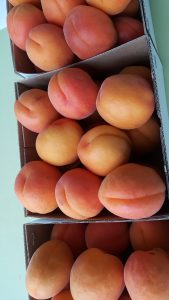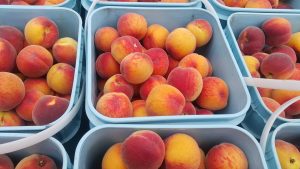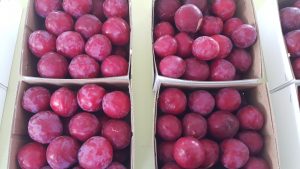Roberts Family Fruit summer fruit varieties in the orchard are amongst the most varied in all of Central Otago. We have at least:
- 22 varieties of cherries
- 14 varieties of nectarines
- 13 varieties of peaches
- 12 varieties of apricots
- 9 varieties of plums and
- 2 varieties of pluots
The orchards summer fruit varieties are chosen for their great taste and texture and also by when they are ready to pick and pack for market. By having different varieties ready to pick at different times over the season allows us to spread the workload of pre-harvest tree and fruit maintenance, picking, packing and marketing so everything doesn’t go through production processing at the same time.
If you can’t get to Roberts Family Fruit Country Store, you can order online at our online store or call on 03 449 2067 to check what fruit and veggies are fresh in today. Or you can email your inquiry or order to arrange a delivery.
Apricots
 Golden orange apricots have a velvety skin and firm, sweet and tangy flesh. Apricots were recorded in China and India as far back as 3,000 BC. They are a staple food and trade item in Eurasia and Persia for millennia. Dried apricots have been around just as long with smoked apricot being used as an ancient Chinese and Japanese remedy.
Golden orange apricots have a velvety skin and firm, sweet and tangy flesh. Apricots were recorded in China and India as far back as 3,000 BC. They are a staple food and trade item in Eurasia and Persia for millennia. Dried apricots have been around just as long with smoked apricot being used as an ancient Chinese and Japanese remedy.
Considered one of nature’s super foods, apricots ares low in calories and provide good sources of dietary fiber, Vitamin A & Carotene antioxidants, Vitamin C, potassium, iron, zinc, calcium and manganese.
We start picking our earliest variety before Christmas and continue harvest through until late March.
The bulk of our apricots are sold in New Zealand supermarkets and our roadside fruity and veggie stall with some exported to Australia.
Nectarines
Nectarines take their name from the word ‘nectar’, meaning ‘sweet liquid’. With smooth skin, nectarines are a variant of the peach that came from China over 2000 years ago. We grow both white and yellow fleshed nectarines. Similar to peaches in size, nectarines smooth skin means that they can be enjoyed as they come with no need to peel them as some do with peaches. Nectarines have a unique juiciness, tangy taste and fragrant aroma.
Being a great source of vitamin A and C, have high levels of potassium, calcium and dietary fiber, nectarines are a very healthy addition to everyone’s diet.
Both nectarines and peaches share similar characteristics of either yellow or white flesh and either clingstone and freestone varieties. Clingstone, describes how the flesh clings to the furrowed, egg-shaped seed stone, and freestone where the flesh comes easily away from the stone.
Peaches
 This medium sized round to oval shaped fruit is considered New Zealand’s iconic summer fruit. Sweet and juicy, the peach is easily recognised by its velvety, fuzzy skin; the fuzz varying with different varieties. White flesh varieties are typically very sweet with little acidity while yellow-fleshed peaches tend to have an acidic tang coupled with sweetness, though this also varies greatly. Both flesh colours often have some red on their skin.
This medium sized round to oval shaped fruit is considered New Zealand’s iconic summer fruit. Sweet and juicy, the peach is easily recognised by its velvety, fuzzy skin; the fuzz varying with different varieties. White flesh varieties are typically very sweet with little acidity while yellow-fleshed peaches tend to have an acidic tang coupled with sweetness, though this also varies greatly. Both flesh colours often have some red on their skin.
A large peach has fewer than 70 calories and contains approximately 3 grams of fiber. This highly nutritious fruit also provides carbohydrates, iron, potassium, vitamin A, B(folate) and C.
Plums
 Delicious, fleshy and succulent, plum varieties range from sweet tasting to quite tart, but always with that distinctive, pleasing aroma. The flesh itself comes in a wide variety of colours including green/yellow, crimson and creamy yellow. Often a dusty white coating is found on plums. This is not any sort of spray residue but created by the plum to help prevent attack by small insects. Historically it is believed plums were one of the first fruits domesticated by humans. When plums are dried they are called prunes.
Delicious, fleshy and succulent, plum varieties range from sweet tasting to quite tart, but always with that distinctive, pleasing aroma. The flesh itself comes in a wide variety of colours including green/yellow, crimson and creamy yellow. Often a dusty white coating is found on plums. This is not any sort of spray residue but created by the plum to help prevent attack by small insects. Historically it is believed plums were one of the first fruits domesticated by humans. When plums are dried they are called prunes.
Keep an eye out for our delicious greengage plums. These are an old English heirloom variety of green skinned plum with a very distinct sweet and juicy flesh when fully ripe. A local favourite.
Plums are rich in dietary fiber, helping to create a healthy digestive system. They are enriched with minerals like potassium, magnesium, manganese, copper, and phosphorus with traces of calcium, iron, and zinc also present. Plums are full of vitamin C, K, and A are present in plums along with trace elements, vitamin E, B6 and folate.
